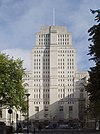This is an old revision of this page, as edited by StefenTower (talk | contribs) at 15:46, 25 April 2005 (→General Information: NPOV and minor cleanup). The present address (URL) is a permanent link to this revision, which may differ significantly from the current revision.
Revision as of 15:46, 25 April 2005 by StefenTower (talk | contribs) (→General Information: NPOV and minor cleanup)(diff) ← Previous revision | Latest revision (diff) | Newer revision → (diff)King's College London (often abbreviated to KCL) in London is one of the largest colleges in the federal University of London, with 19,500 registered students. King's was so named to indicate the patronage of King George IV.
Campuses
King's began on a site adjacent to Somerset House in the Strand, still in use and still organized around the original building; the university has spread to several other campuses as well, including the Guy's campus near London Bridge, the St. Thomas' campus facing the Houses of Parliament across the Thames, Waterloo campus across from the BFI London Imax and the Hampstead Halls campus, formerly the site of Westfield College, since merged with Queen Mary. The current institution is the product of the merger of King's with a number of other institutions over the years, including Queen Elizabeth College, Chelsea College, the Institute of Psychiatry, Guy's Hospital, and St Thomas' Hospital.
General information
King's was founded as the fourth oldest university in England with Crown, Church of England and political support amid popular opposition to the foundation of humanist University College London, third oldest university in England after Oxbridge, on Gower Street. Indeed a duel was fought over the College's honour between the then-Prime Minister, the Duke of Wellington, and the Earl of Winchilsea who questioned the Prime Minister's support for Catholic and Anglican institutions, but nobody was injured. Rivalry between the two colleges continues today, University College London often claiming superiority over King's through its higher rankings in university league tables. But King's is widely supposed to be the more famous of the two colleges.
King's is a member of the elite Russell Group of leading research universities and is consistently ranked as one of the top 20 universities in UK, and is particularly highly regarded for medicine, engineering, history, theology and law. It has the fifth largest endowment of UK universities, the fourth largest endowment per student, and has credit ratings of AA-/Stable/A-1 (Standard & Poor's).
Florence Nightingale's original training school for nurses was at St Thomas' Hospital and King's College Hospital. Perhaps the most famous scholarly research performed at King's was the work by Rosalind Franklin and Maurice Wilkins that was essential to the discovery by James D. Watson and Francis Crick of the structure of DNA.
King's is also known for its top ranked War Studies department that attracts students with both a civilian and military background across the world. It is supported by facilities such as the Liddell Hart Centre for Military Archives and the King's Centre for Military Health.
Students' Union
King's College London Students' Union (KCLSU) is the second oldest in London, founded just after University College London Union, and provides an enormous range of activities and services: over 50 sports clubs, 60 societies, a wide range of volunteering opportunities, 4 bars, 2 nightclubs, shops, eating places and even a Gym. It is arguably the best students union of University of London. Recently, a third site was opened at the Waterloo campus which finally completes development of services across the three key KCL sites. A former President of KCLSU, Sir Ivison Macadam went on to be elected as the first President of the NUS and the Union has played an active role there and in the University of London Union ever since. Competition and rivalries within the University of London between King's and University College London are still fierce but unlike the riots between respective College students in central London that still occured until the 1950s, things are now limited to the Rugby pitch and skullduggery over mascots.
Famous Alumni
Well-known alumni of King's College include:
- Arthur C. Clarke
- George Carey
- Quentin Crisp
- John Deacon
- Peter Higgs
- Derek Jarman
- John Keats
- Florence Nightingale
- David Owen
- Desmond Tutu
See also:
There is also a King's College, Cambridge.
